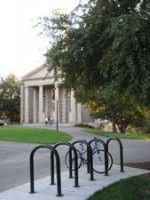Maroon Goes Green

As members of the incoming first-year class know from their summer reading assignment, global climate change and environmental preservation are prevalent issues on the Colgate campus. In that vein, a student-run program called Green Bikes began this past May.
The program purchased 12 new mountain bikes over the summer, which were assembled at Adventure Bike and Boards in Hamilton. Students who join the program have access to each of the 12 blue bicycles scattered on racks throughout campus and downtown.
“The bikes are blue, but the idea is green,” said Assistant Director of Outdoor Education and faculty advisor for the Green Bikes program Brett Zefting, who also happens to use the bikes frequently to get up the hill.
Green Bikes aims to decrease participants’ dependence on cars by providing environmentally friendly transportation that is available for any program member at any time.
There are no reservations; members are free to take any Green Bike they come across. Participants can unlock a bike, ride it to where they need to go (no parking spots needed), and lock it up again for the next member’s use.
The idea for a campus-wide community bike program dates back to the Green Summit of October 2005. Spring saw the first donation of used bikes for a less official version of the current program. Most of the donated bikes were in such disrepair that is was more cost-effective to purchase new ones rather than fix the used ones. Funding for the program came from the Wellness Initiative, the Broad Street Initiative and the Environmental Council.
The Green Bikes program is just one part of a larger initiative on campus called Green Strides. Green Strides implements a myriad of environmental measures throughout campus, from replacing standard ink and paper with soy-based ink and recycled paper to using organic fertilizer on the grounds and placing energy-efficient windows in most buildings. Another “green stride” is the use of wood chips, much of which are by-products of a local furniture maker, in the supplying of most of the heat and hot water on campus.
Dining Services, too, has been making “green strides.” The various dining options around Colgate exclusively use recycled, unbleached napkins, which are offered at the table to reduce waste. The Recycle Mug Program at the O’Connor Campus Center (Coop) allows students to purchase a reusable mug for $2.50, which then gives them a discount on future refills. Sodexho, the company that runs campus dining, donates $.15 per cup sold to the National Fish and Wildlife Association.
In addition, Colgate is seeking LEED (Leadership in Energy and Environmental Design) Certification from the U.S. Green Building Council for The Case Library and Geyer Center for Information Technology renovation. Under the LEED rating system, buildings are awarded points for environmentally-friendly features, such as sustainability and water and energy efficiency.
In comparison, the current Green Bikes program may seem small, but the fleet of 12 is merely a trial run.
“We will start increasing the fleet in line with the amount of users as that increases,” Zefting said, who believes that the program’s benefits will be attractive to many students. He argues that the bikes are convenient and take the same amount of time that cars do to get around campus.
“Because they’ve been direct-marketed to, the majority of members are Outdoor Education leaders,” Zefting said. He hopes the program will really get under way this semester, with more and more students participating.



